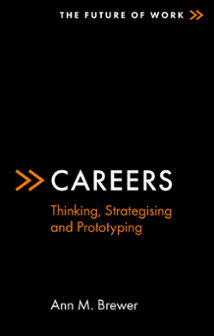Capability continuum in career disruption period
, 30
Career development
, 131–132
applying design thinking to learning
, 136
collaborative career design
, 140–141
conventional career planning
, 134
design learning in practice
, 136–138
design thinking for
, 134, 141–145
educational institutions
, 134–135
human-centric learning
, 135–136
new career horizons
, 138–139
people-centred career design
, 139–140
Career mindset
, 149
action-orientated learning
, 154–155
double-loop learning
, 156–157
flexible thinking
, 150–151
guided reflection
, 151–154
Career opus framework
, 183–184, 199
career vision
, 184–186
collaborative and individual career co-designing
, 188–189
personal career values
, 186–187
value propositions for career people and designers
, 187–188
Career prototyping
, 172, 176, 191–192
archetypes
, 177–178
career coaching exercise
, 181–182
career opus framework
, 183–189
developing career clinic for
, 182
divergent and convergent thinking
, 179–180
envisioning ideal career through prototyping
, 173–176
identifying career gaps in market
, 178
innovating
, 178
learning theory and collaborative career building
, 180–181
narrative
, 176–177
occupational analysis
, 190–202
post-prototype career design
, 202–203
progressing
, 176
translating ideas into outcomes
, 179
Career-focussed enterprise
, 218
career strategy
, 219–221
career thinking
, 218–219
career value chain management
, 219
Career-focussed organisational culture
, 223–224
Careers
, 3–4, 32, 171–172, 211–212, 216
ambition
, 55–58
attributes
, 21–26
career-focussed enterprise
, 218–221
career-focussed organisational culture
, 223–224
career-mindedness
, 11
change
, 83–85, 171–172
choices
, 9
coaching exercise
, 181–182
corporate career citizenship
, 217–218
counsellors
, 37n1
CSR
, 215–217
culture
, 224
cycle assessment analysis
, 219
decision making
, 53, 102–103, 108–109
defining CSR in corporate disruption era
, 213–215
design thinking development
, 221–223
discovery
, 175–176
education
, 29–32
equity
, 216
experience
, 132–133, 172
failure
, 59–66
fulfilment
, 10
HRM
, 219–220
innovation and
, 20–21
journey
, 47, 185
making
, 105
mindfulness
, 48–50
motivations
, 14
organisational culture
, 223–224
organisational learning
, 221–223
ownership
, 186
paths
, 8
people searching for
, 4
perspectives, context and structures
, 7–10
portfolio
, 107
problem solving
, 107–109
purpose
, 53–55
recruiting
, 220
selection
, 175–176
shape preferences
, 105
shift
, 83
sociology
, 17–19
solutionism
, 27–28
specialists shape careers
, 196–197
stakeholders
, 5–6
stewardship
, 218
strategising
, 158–159
strategy
, 219–221
strengths
, 190–194
success
, 58–59
themes in career thinking
, 10–11
thinking
, 26
transformations
, 47
tree
, 185
value chain
, 160–161
and work
, 6–7, 14–17
workforce
, 12–14
working
, 14–17
workplaces
, 14–17
Choice making
, 120
control in choice making about careers
, 78
creating or designing
, 103
Competence in career thinking
, 45
action-orientated and guided learning
, 72–79
career ambition
, 55–58
career failure
, 59–66
career mindfulness
, 48–50
career purpose
, 53–55
career success
, 58–59
career thinking perspectives
, 66–72
cultural intelligence
, 50–53
EI
, 50–53
interpersonal aspects of careers
, 79–83
turning points
, 46–48
well-being and career change
, 83–85
Comprehensive contradiction
, 76–77
Constructivist learning theory
, 180
Conventional career planning approach
, 133
with design thinking
, 134
Corporate career citizenship
, 217–218
Corporate design thinking
, 218
Corporate social responsibility (CSR)
, 36, 212, 215–217
defining in era of corporate disruption
, 213–215
Corporate sustainability principles
, 224
Cultural logic of late capitalism
, 29
Culturally responsive curriculum
, 30
